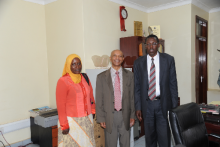WHO to strategically support Uganda’s cancer and heart institutes
Kampala, 29th January, 2014:- The WHO Country Representative for Uganda Dr Wondimagegnehu Alemu visited the Uganda Cancer Institute (UCI) and the Uganda Heart Institute (UHI) to acquaint himself with their operations. It was his first official visit to the two centres since his arrival in the country eight months ago.
The Director of UCI Dr Jackson Orem gave a background of the institute that was established in 1967. He added that in Uganda, UCI is spearheading implementation of the WHO recommendation that calls upon African countries to prioritize cancer control.
In that regard the UCI carries out prevention and cancer care activities including community cancer outreaches and cancer surveillance. In addition UCI was selected to host the Africa Cancer Virtual University at which local and international students are mentored about cancer prevention and control.
However, UCI has an acute staff shortage which Dr Orem attributes to attrition as members leave to look for “greener pastures”. “We cannot stop them as what they get here is really little compared to what other organizations give them”, he added.
The other is lack of equipment for the newly constructed 100-bed ward that is completed but lies idle. “We now have space, but we cannot move in due to lake of equipment,” said Dr Orem.
Despite such problems, UCI looks forward to closer collaboration and support from WHO and other partners. Dr Orem mentioned staff training, expansion of services to rural areas, strengthening diagnostic services and strengthening the referral system as some of key areas in which they need assistance. Other areas include surveillance especially cancer registration, and the chemotherapy supply chain with regard to patient care.
At the UHI, the Executive Director Dr John Omagino reported rising cases of cardiac and other Non Communicable Diseases (NCDs) seen at the institute. “There is an unfolding epidemic, not yet estimated, that poses grave danger to this country’s development,” he said. For instance, only about 1,000 children are diagnosed at the institute every year of the 13,000 born with heart-related problems.
Dr Omagino thus requested for specialised equipment, training and above all, bigger premised to accommodate the institute that is now over crowed with patients. Currently however, cabinet approved a bill to be reconstituted UHI into an autonomous entity and is waiting for parliament to enact it into law. UHI has also put emphasis on teaching, research and data collection to guide the country on policy formation and strategic planning for NCDs in general and Cardiovascular Disease in particular.
Dr Alemu assured both directors of WHO’s continued strategic and technical collaboration to address some of the constraints they face. He particularly mentioned the STEP Survey on NCD risk factors that WHO is supporting MOH to undertake in Uganda as one such activities that will generate invaluable data and information on risk factors to guide formulation of strategic interventions against cancers, cardiovascular diseases and other related NCDs generally.




